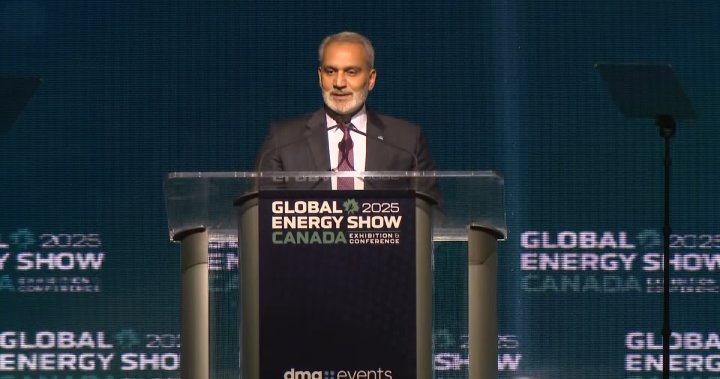The world’s thirst for oil isn’t slowing anytime soon, despite what climate advocates might wish. That was the clear message from OPEC’s top official during his visit to Calgary this week, where industry leaders gathered amidst a palpable sense that their sector has regained its swagger.
Walking through the sprawling exhibition floor at the Global Energy Show, I couldn’t help but notice the contrast from just a few years ago. Gone was the somber mood that had dominated during the pandemic downturn. In its place stood confident executives and workers with a renewed sense of purpose.
OPEC Secretary-General Haitham Al Ghais delivered the keynote address that had the Stampede City buzzing. His assessment was blunt: global demand for oil continues to rise, and calls to rapidly phase out fossil fuels are detached from reality.
“The narrative that demand for oil will soon peak is simply not supported by the facts on the ground,” Al Ghais told the packed conference hall. “We’re seeing growth in energy demand, especially in developing economies, that cannot be met by renewables alone.”
His comments come at a time when Calgary’s energy sector has experienced something of a renaissance. After weathering years of pipeline delays, price crashes, and increasing regulatory pressure, many companies are reporting strong profits and stable operations.
“It’s like night and day compared to 2020,” remarked Sarah Davidson, operations manager at a midsize Calgary producer I spoke with on the exhibition floor. “We’re not popping champagne, but there’s definitely more breathing room to plan for the future.”
The OPEC chief’s skepticism toward the aggressive net-zero targets adopted by many Western governments resonated with many attendees. Al Ghais specifically criticized policies that he believes unfairly target oil producers while ignoring the continuing reality of consumer demand.
Calgary Mayor Jyoti Gondek, who has worked to position the city as an energy transition leader, offered a more nuanced perspective during her panel appearance. “We need to acknowledge the ongoing importance of our traditional energy sector while simultaneously building capacity in emerging technologies,” she said.
The conference itself reflected this tension. Traditional drilling and production companies dominated the main exhibition spaces, while renewable energy firms and carbon capture technologies occupied noticeably smaller areas.
Alberta Energy Minister Brian Jean emphasized the province’s practical approach. “We’re focused on responsible development that recognizes the continuing importance of our oil and gas resources to both Alberta’s economy and global energy security,” he told reporters after touring the exhibition.
Recent data from the Canada Energy Regulator supports Al Ghais’s claims about rising demand. Their latest outlook projects that global oil consumption will continue growing through at least 2030, even as renewable energy deployment accelerates.
For Calgary’s downtown core, the renewed energy optimism has brought welcome relief. Office vacancy rates, while still high at around 30%, have stabilized after years of climbing. Restaurant owners near the Telus Convention Centre reported their busiest week since the last Stampede.
“We’ve been slammed since Monday,” said Marcus Jennings, manager at a popular 9th Avenue eatery. “These energy conferences bring in the expense accounts, and after years of cutbacks, people seem more willing to spend again.”
Not everyone welcomed the OPEC secretary-general’s message. A small but vocal group of climate protesters gathered outside the convention center, arguing that industry leaders are delaying necessary changes to address climate change.
“They’re putting profits ahead of our planet’s future,” said protest organizer Leah Wilson. “Calgary has the expertise and workforce to lead in clean energy if the political and corporate will existed.”
The protesters’ presence highlighted the ongoing debate about Calgary’s identity as an energy city and what that means in a carbon-constrained world.
Al Ghais acknowledged climate concerns but maintained that oil would remain essential through any energy transition. “OPEC members are investing in cleaner production methods and emissions reduction technologies,” he stated, “but we must be realistic about the timeline for any substantial shift in the global energy mix.”
For many Calgary energy workers, the conference provided reassurance about their industry’s medium-term prospects. Engineering firms reported increased hiring, and several companies announced new capital projects during the event.
As the Global Energy Show wrapped up yesterday, the contrast with recent years couldn’t be more striking. The cautious optimism I observed reflects a sector that has survived extraordinary challenges but now faces the complex task of navigating an uncertain energy transition on its own terms.
Whether OPEC’s confidence about sustained oil demand proves accurate remains to be seen. But for now, Calgary’s energy industry appears determined to chart a course that preserves its core business while selectively embracing new opportunities.
And for a city whose fortunes have always been tied to energy, that pragmatic approach might just offer the most sustainable path forward.







